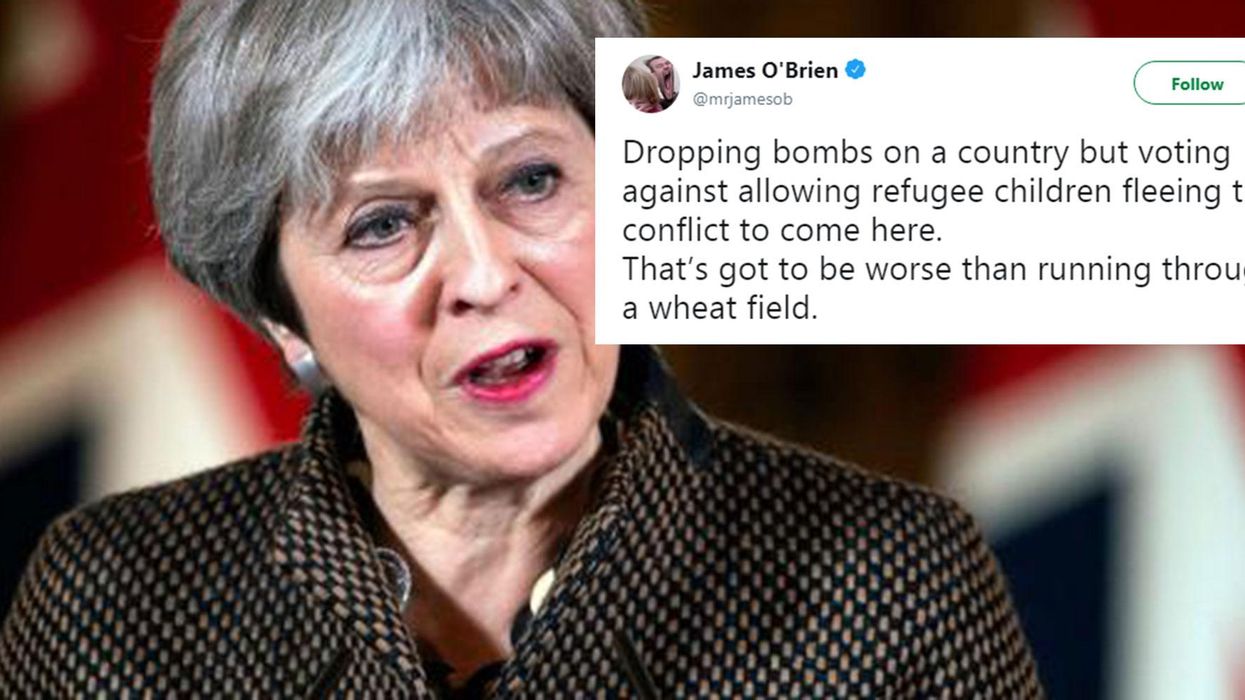News
Jake Hall
Apr 14, 2018
Earlier this morning, Prime Minister Theresa May gave an impassioned speech defending her decision to launch airstrikes against Syria co-ordinated alongside the US and France.
The bombs were dropped in response to a “despicable and barbaric” attack in Douma, Syria last week, which is thought to have been conducted with chemical weapons. Up to 75 victims are thought to be dead, with as many as 500 more thought to be seriously injured.
Syria is currently in the midst of a Civil War described as one of the greatest humanitarian crises of our time. According to WorldVision, the conflict has left 13 million Syrian citizens in need of assistance; more than 5.6 million have fled the country in search of asylum, whereas a further 6.1 million have been internally displaced. Half of these affected victims are thought to be children.
In 2016, thousands of these minors travelled unaccompanied to Europe in search of aid. When they arrived, MPs took a vote on whether or not to accept them.
At the time, Theresa May, alongside 293 other MPs, voted against accepting them.
This irony was pointed out online.
In today's rousing speech, May stated a belief that she had acted in Britain’s national interest by co-ordinating airstrikes with the US and France.
Last night, four British fighter planes fired missiles at a Syrian military facility thought to contain chemical weapons. The aim of dropping these bombs was to send the unequivocal message that the use of chemical weapons – which May states is a “breach of Syria’s obligations under the Chemical Weapons Convention” – is unacceptable.
To further justify her decision, May drew upon traumatic accounts of the country’s ongoing devastation in order to reinstate the point that Syrian residents are in severe danger.
We have seen the harrowing images of men, women and children lying dead with foam in their mouths.
These were innocent families who, at the time this chemical weapon was unleashed, were seeking underground shelter in basements.
First-hand accounts from NGOs and aid workers have detailed the most horrific suffering, including burns to the eyes, suffocation and skin discolouration, with a chlorine-like odour surrounding the victims.
According to official statistics, last year saw applications for asylum in the UK drop once again. Schemes like the Syrian VPRS (Vulnerable Persons Relocation Scheme) have already resettled thousands of Syrian nationals, yet AlJazeera recently reported that aid agencies were concerned by a “global anti-refugee backlash” which, they say, have sparked fear that hundreds of thousands of Syrians will be pushed to return despite ongoing conflict.
Karl Schrembi, a spokesperson for the NRC (Norwegian Refugee Council) also claimed that the US and wealthy European countries were complicit in the sustainment of this backlash through their lack of solidarity:
[They] can be doing so much more to help the refugee-hosting countries in the Middle East.
According to the report, there are misconceptions that Syria is safe to return to – a statement which these latest strikes seem to disprove.
Furthermore, the concept of safety within a country can differ according to minority status. Last year, May drew criticism for official Home Office guidelines which sought to justify the deportation of LGBT+ asylum seekers to countries in which they could be legally persecuted. Written specifically in reference to Kabul, Afghanistan, the official line is that closeted gay men could realistically survive:
While space for being openly gay is limited, subject to individual factors, a practising gay man who, on return to Kabul, would not attract or seek to cause public outrage, would not face a real risk of persecution.
In the absence of other risk factors, it may be a safe and viable option for a gay man to relocate to Kabul, though individual factors will have to be taken into account.
Furthermore, LGBT+ asylum seekers were this year reported to disproportionately suffer physical, verbal and sexual abuse in UK shared homes.
More: Theresa May allegedly 'misled' the Queen over the DUP deal
Top 100
The Conversation (0)














